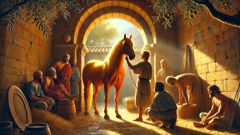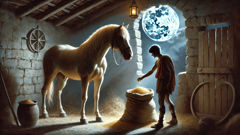Introduction
In the timeless hills of ancient Greece, where olive trees stretched their gnarled limbs toward an endless sky and the scent of wild thyme danced on the breeze, there lived a horse unlike any other. This stallion, named Xanthos for his golden hide, was the pride of the village of Pteleon. His mane shimmered like sunlight on the Aegean Sea, and his hooves struck the earth with a quiet thunder, admired by every child and farmer who passed. His stall was positioned beside the old stone well, a place where elders gathered to share wisdom and travelers paused to drink. He was more than a beast of burden—he was a symbol of the community’s resilience and hope. Yet, beneath the surface of this harmonious scene, an invisible current stirred, a tension that only the most attentive would notice. Xanthos’ groom, Lysandros, was a young man with quick hands, a charming smile, and eyes that darted like swallows in the dusk. Each morning, he would brush Xanthos’ coat until it gleamed, braid his mane with careful fingers, and speak in tones so gentle that even the barn cats purred nearby. Villagers, passing by, would nod their approval and whisper of the groom’s diligence. But as the sun set and shadows crept over the fields, Xanthos felt a persistent hunger gnawing at his belly—a hunger that even the sweet scent of hay could not quell. The days grew longer, the admiration of the townsfolk louder, but something essential was missing from the horse’s life. This is the story of how Xanthos, the golden stallion, uncovered a truth as old as the hills—a lesson that still echoes among the olive groves: that actions speak far louder than the shine of appearances, and that genuine care cannot be faked with a polished coat or an easy word.
The Show of Care
Xanthos awoke every morning to the sound of Lysandros humming a lilting tune, the tune his mother had sung while spinning wool by the hearth. The sun had barely crested the distant ridges, yet Lysandros was already at the stable, water pail in one hand, currycomb in the other. He moved with purpose, whistling as he swept straw from the stall and refreshed the bedding. Villagers admired his dedication, often stopping to watch as the young groom worked.

Xanthos felt the gentle pull of the comb through his mane, the satisfying rasp as dirt was loosened from his coat. Lysandros’ hands were skilled, his touch almost loving. When he reached for the brush, his strokes were slow, deliberate, and almost reverent, smoothing the horse’s coat until it shimmered like polished bronze. Afterward, he would braid a few strands of the horse’s mane, adding a sprig of wild rosemary—a token of care, or perhaps a charm for good luck. Those who passed by remarked on the horse’s beauty. “Never have I seen such a well-kept animal,” old Menelaos, the village elder, said. “Lysandros, you do your family proud.” Lysandros would bow his head modestly, though his eyes flickered with something like pride.
But as the days wore on, Xanthos began to feel a strange fatigue. Though he looked as grand as ever, his steps grew heavy, his appetite waned, and the energy that once propelled him across meadows seemed to seep away. At first, he thought it was the heat of summer. Yet, even as the evenings cooled and dew glistened on the grass, his vigor did not return.
Unbeknownst to the villagers, Lysandros had grown fond of applause. Each compliment seemed to fill him with lightness, and he became obsessed with the horse’s appearance. Grooming took longer each day; Lysandros experimented with new braids, polished Xanthos’ hooves to a mirror finish, and even cleaned the stall twice daily. The horse’s sleekness became a legend, inspiring travelers from other towns to detour through Pteleon just for a glimpse.
Yet, each evening, as darkness pressed close, Lysandros would linger in the barn after everyone had left. He would fetch a small cloth sack and quietly scoop a portion of Xanthos’ best oats into it. He hid the sack beneath his tunic, then crept away through a break in the fence toward his uncle’s house, where the oats were exchanged for a few drachmae or a wedge of cheese. No one questioned the missing grain; after all, Xanthos looked magnificent, and Lysandros was tireless in his devotion.
But Xanthos knew. His hunger sharpened with each passing night, and his strength faded. He whinnied softly for more, but Lysandros only patted his neck, murmuring about the importance of looking one’s best. The villagers never saw the dullness behind the stallion’s eyes, or the weight he was losing beneath his glossy coat.
The Weight of Deceit
As weeks drifted by, Xanthos’ condition worsened. He stumbled once on the path to the well, and children who used to run their hands over his smooth flanks now hesitated when he lowered his head without spirit. The old men at the tavern whispered that perhaps age had caught up with the golden stallion. Yet, Lysandros doubled down on his routine, polishing and brushing with frantic intensity as if he could scrub away Xanthos’ malaise.

One night, as the moon hung low and silver over the olive groves, Xanthos lay in his stall, restless and aching. A cool breeze teased through the open window, carrying with it the soft crunch of footsteps. Through half-closed eyes, Xanthos watched Lysandros slip inside, glance around nervously, and scoop oats into his sack. For the first time, the horse understood: the hands that soothed his coat by day were the same hands that stole his sustenance by night.
A quiet rage flared in Xanthos’ heart. He stomped a hoof, startling Lysandros, who froze for a moment but then smiled sheepishly and whispered, “Shhh, my friend, beauty is what matters. Tomorrow you’ll be the envy of all.” Lysandros left as silently as he’d come. But Xanthos could not sleep. His mind turned over and over what he had seen—how the world’s praise meant nothing if he felt hollow inside, how appearances could never replace true care.
The next morning, villagers gathered for the midsummer festival. Wreaths hung from doorways, and children wove flower crowns. Lysandros prepared Xanthos with particular care, brushing until the stallion’s hide shone and tying bright ribbons into his mane. As he led the horse into the square, applause rang out. But Xanthos’ legs trembled, and his usually proud neck drooped. An old woman, wise with years and the mother of three generations, peered into the horse’s eyes. “He’s sick,” she murmured. “Not on the outside—inside. He looks beautiful but lacks spirit.”
The words hung in the air. For the first time, villagers noticed Xanthos’ gaunt flanks and tired gaze. The applause faltered. Lysandros felt their stares, sensed suspicion. That night, burdened by guilt and fear, he hesitated before entering the barn. He stood at the threshold, sack in hand, while Xanthos fixed him with a gaze that seemed to pierce through all pretense.
Lysandros’ hands shook. He tried to reassure himself that his actions were harmless, but the horse’s unwavering stare made it impossible. For a long moment, boy and beast regarded each other—one shamed by the truth, the other yearning for simple honesty. With trembling fingers, Lysandros dropped the sack and turned away, unable to continue his nightly theft.
Conclusion
Word of Xanthos’ decline traveled quickly. The elders called for a gathering in the village square. Lysandros, pale and remorseful, confessed his theft before all, unable to meet anyone’s eyes—least of all Xanthos’. The villagers listened in silence as he explained how he had become obsessed with appearances, trading the horse’s health for fleeting praise. The old woman spoke: “A shining coat is no substitute for a strong heart. True care is not what you show the world, but what you do when no one is watching.” Moved by shame and regret, Lysandros returned the stolen oats and spent the following weeks nursing Xanthos back to health. He rose before dawn to bring fresh water and tended not just to the horse’s coat but to his hunger and spirit. Slowly, Xanthos regained his strength. His eyes grew bright once more, his step lively. Villagers learned to look beyond outward beauty—to see kindness in actions rather than in mere polish. Lysandros never again put appearances before substance. He and Xanthos became a symbol of renewed trust and honesty, inspiring others to value sincerity above show. The fable of the horse and his groom became part of village lore—a story told beneath olive trees and by flickering firelight, reminding each new generation that true care is measured by deeds, not display.













